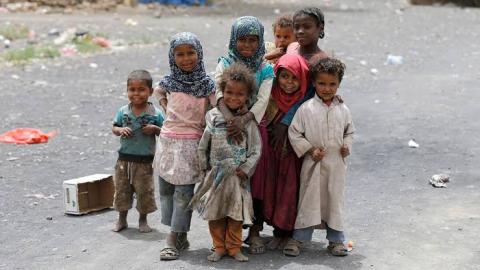Yemen’s forgotten children


With Christmas and new year centred around children, how many of us have given a thought over the holiday season to the children of Yemen — and how much of the general public knows of Britain’s role in their suffering, asks IAN SINCLAIR
RECENTLY gained an insight into the horrific conditions in the troubled Middle East nation when I watched Hunger Ward.
Released in 2020, the MTV documentary is filmed inside two therapeutic feeding centres in Yemen, following two female healthcare workers treating starving children in the midst of the war.
Just 40 minutes long, it’s a harrowing, heart-breaking watch: we see resuscitation being carried out on a baby and the family wailing in grief after the child dies.
“These children are dying as a result of malnutrition,” Mekkia Mahdi, a nurse who manages the largest network of rural malnutrition clinics in North Yemen, explains. She scrolls through photos of children on her phone: “Amal died, Ibrahim died, Fatima died.”
While Yemen has long been impoverished, the military intervention by the Saudi-led coalition in March 2015 against the Houthi rebels, who had recently ousted president Abdrabbuh Mansour Hadi, massively intensified the death and destruction.
The fighting continues, with Saudi Arabia undertaking a huge bombing campaign, along with an air, sea and land blockade.
“Conflict remains the primary underlying driver of hunger in Yemen,” 30 NGOs operating in Yemen, including the International Rescue Committee, Oxfam and the Norwegian Refugee Council, noted in September.
In October the UN Office for the Co-ordination of Humanitarian Affairs warned the situation in Yemen remained the world’s worst humanitarian crisis.
According to a November briefing from the UN World Food Programme (WFP), 17 million Yemenis, over half of the population, are estimated to be food insecure, with 3.5m acutely malnourished.
“Malnutrition rates among women and children in Yemen remain among the highest in the world,” the WFP reports. “1.3m pregnant or breastfeeding women and 2.2m children under five requiring treatment for acute malnutrition.”
Sadly, there is no shortage of horrifying statistics highlighting the plight of Yemen’s children.
An estimated 77 per cent of the 4.3m people displaced in Yemen are women and children, according to Reliefweb, the information service provided by the UN Office for the Coordination of Humanitarian Affairs.
By the end of 2021, the UN Development Programme estimated the number of direct and indirect deaths due to the war was 377,000.
“Of the total deaths, 259,000 — nearly 70 per cent of total conflict-attributable deaths — are children younger than five years old,” the report noted.
Shamefully, alongside the US, Britain has played and continues to play a crucial role in fuelling the conflict, and therefore bears significant responsibility for the ongoing humanitarian catastrophe.
Asked by Majella magazine in 2018, “What do you think Britain can do more in the realm of helping the Saudi-led coalition in Yemen?” Alistair Burt MP, then-minister of state for the Middle East, replied: “At the moment it’s difficult to see what more we can do.”
For once, a Tory politician was telling the truth. In September the Campaign Against Arms Trade estimated that since March 2015 the British government has licensed at least £23 billion of arms to the Saudi-led coalition.
However, as Burt intimates, support goes far beyond just selling weapons.
“Every day Yemen is hit by British bombs — dropped by British planes that are flown by British-trained pilots and maintained and prepared inside Saudi Arabia by thousands of British contractors,” Arron Merat noted in the Guardian in 2019.
Appearing in the Channel 4 documentary Britain’s Hidden War the same year, a former Saudi air force officer explained Saudi Arabia “can’t keep the [British-made] Typhoon [aircraft] in the air without the British. The pilots they can’t fly it without maintenance and without the logistics.”
We also know British military personnel are based in the command and control centre for Saudi airstrikes and have access to target lists.
And according to a 2019 Daily Mail report, British Special Boat Service soldiers are on the ground in Yemen, operating as Forward Air Controllers, requesting air support from the Royal Saud Air Force.
On the world stage, Britain provides diplomatic cover for Saudi Arabia’s ongoing slaughter.
“The UK is the penholder at the UN over Yemen [the lead country on the security council, with the power to draft resolutions and statements], and some former Conservative Cabinet ministers, notably Andrew Mitchell, say Britain has been protecting Saudi Arabia from criticism there,” the Guardian reported in 2018.
Morning star

Yemeni officials on Monday condemned arrests and prosecutions by the Iran-backed Houthi militia directed against media, journalists and celebrities…

Yemen's warring parties are gearing up for new waves of conflict in 2023 amid a lack of decisive steps towards sustainable peace, adding to the suf…

The UAE will help to recruit doctors and deliver crucial supplies for hospitals in Yemen under a major healthcare drive. The Khalifa bin…